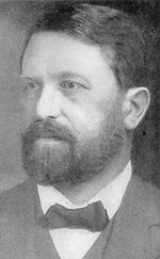
Theodor Boveri
Encyclopedia
Theodor Heinrich Boveri (12 October 1862 – 15 October 1915) was a German
biologist
. He was married to the American biologist Marcella O'Grady (1863–1950). Their daughter Margret Boveri
(1900–1975) became one of the best-known post-war German journalists.
s showed that it was necessary to have all chromosome
s present in order for proper embryonic development to take place. This discovery was an important part of the Boveri-Sutton chromosome theory
. His other significant discovery was the centrosome
(1888), which he described as the especial organ of cell division. Boveri also discovered the phenomenon of chromatin
diminution during embryonic development of the nematode Parascaris.
He also reasoned in 1902 that a cancerous tumor
begins with a single cell
in which the makeup of its chromosomes becomes scrambled, causing the cells to divide uncontrollably. He proposed the existence of cell-cycle checkpoints, tumour suppressor genes, and oncogene
s and that aberrant mitoses and uncontrolled growth might be caused by radiation
, physical or chemical insults or by microscopic pathogens. It was only later that researchers such as Thomas Hunt Morgan
in 1915 demonstrated that Boveri was correct.
Germany
Germany , officially the Federal Republic of Germany , is a federal parliamentary republic in Europe. The country consists of 16 states while the capital and largest city is Berlin. Germany covers an area of 357,021 km2 and has a largely temperate seasonal climate...
biologist
Biologist
A biologist is a scientist devoted to and producing results in biology through the study of life. Typically biologists study organisms and their relationship to their environment. Biologists involved in basic research attempt to discover underlying mechanisms that govern how organisms work...
. He was married to the American biologist Marcella O'Grady (1863–1950). Their daughter Margret Boveri
Margret Boveri
Margret Antonie Boveri was one of the best-known German journalists and writers of the post-WW2 period.-Life:Margret Boveri was born in Würzburg, Germany, the daughter of German biologist Theodor Boveri and American biologist Marcella O'Grady Boveri. Her father died in 1915 and her mother returned...
(1900–1975) became one of the best-known post-war German journalists.
Work
Boveri's work with sea urchinSea urchin
Sea urchins or urchins are small, spiny, globular animals which, with their close kin, such as sand dollars, constitute the class Echinoidea of the echinoderm phylum. They inhabit all oceans. Their shell, or "test", is round and spiny, typically from across. Common colors include black and dull...
s showed that it was necessary to have all chromosome
Chromosome
A chromosome is an organized structure of DNA and protein found in cells. It is a single piece of coiled DNA containing many genes, regulatory elements and other nucleotide sequences. Chromosomes also contain DNA-bound proteins, which serve to package the DNA and control its functions.Chromosomes...
s present in order for proper embryonic development to take place. This discovery was an important part of the Boveri-Sutton chromosome theory
Boveri-Sutton chromosome theory
The Boveri–Sutton chromosome theory is a fundamental unifying theory of genetics which identifies chromosomes as the carriers of genetic material...
. His other significant discovery was the centrosome
Centrosome
In cell biology, the centrosome is an organelle that serves as the main microtubule organizing center of the animal cell as well as a regulator of cell-cycle progression. It was discovered by Edouard Van Beneden in 1883...
(1888), which he described as the especial organ of cell division. Boveri also discovered the phenomenon of chromatin
Chromatin
Chromatin is the combination of DNA and proteins that make up the contents of the nucleus of a cell. The primary functions of chromatin are; to package DNA into a smaller volume to fit in the cell, to strengthen the DNA to allow mitosis and meiosis and prevent DNA damage, and to control gene...
diminution during embryonic development of the nematode Parascaris.
He also reasoned in 1902 that a cancerous tumor
Cancer
Cancer , known medically as a malignant neoplasm, is a large group of different diseases, all involving unregulated cell growth. In cancer, cells divide and grow uncontrollably, forming malignant tumors, and invade nearby parts of the body. The cancer may also spread to more distant parts of the...
begins with a single cell
Cell (biology)
The cell is the basic structural and functional unit of all known living organisms. It is the smallest unit of life that is classified as a living thing, and is often called the building block of life. The Alberts text discusses how the "cellular building blocks" move to shape developing embryos....
in which the makeup of its chromosomes becomes scrambled, causing the cells to divide uncontrollably. He proposed the existence of cell-cycle checkpoints, tumour suppressor genes, and oncogene
Oncogene
An oncogene is a gene that has the potential to cause cancer. In tumor cells, they are often mutated or expressed at high levels.An oncogene is a gene found in the chromosomes of tumor cells whose activation is associated with the initial and continuing conversion of normal cells into cancer...
s and that aberrant mitoses and uncontrolled growth might be caused by radiation
Radiation
In physics, radiation is a process in which energetic particles or energetic waves travel through a medium or space. There are two distinct types of radiation; ionizing and non-ionizing...
, physical or chemical insults or by microscopic pathogens. It was only later that researchers such as Thomas Hunt Morgan
Thomas Hunt Morgan
Thomas Hunt Morgan was an American evolutionary biologist, geneticist and embryologist and science author who won the Nobel Prize in Physiology or Medicine in 1933 for discoveries relating the role the chromosome plays in heredity.Morgan received his PhD from Johns Hopkins University in zoology...
in 1915 demonstrated that Boveri was correct.
External links
- Fritz Baltzer. (1967). excerpt from Theodor Boveri: The life of a great biologist, 1862-1915. University of California Press, Berkeley; pp. 85–97.

